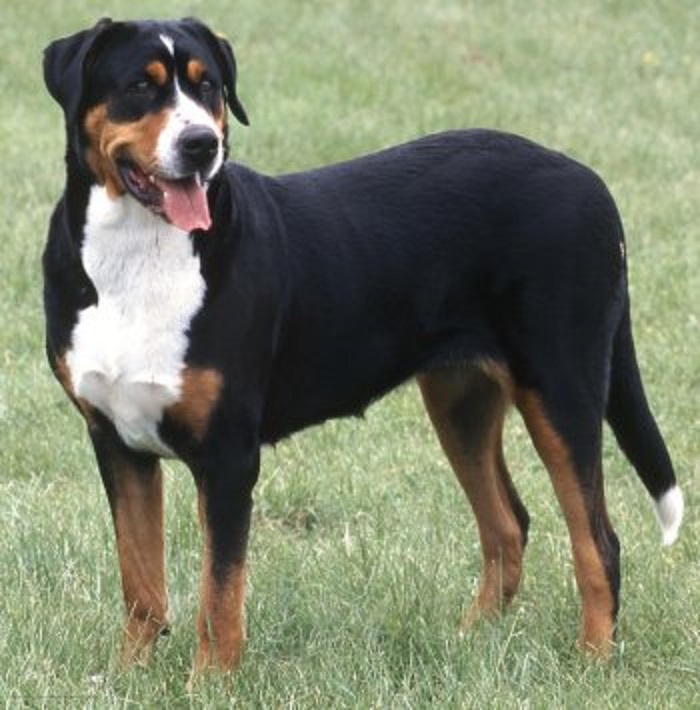
Greater Swiss Mountain Dog

Navigate through the tabs
Navigate through the tabs below to view the breed's info of your interest.
The breed's info is divided in four sections; namely:
the breed's history ,
the breed's main stats ,
the dog's potential health issues
and finally, how the breed scored in 26 different categories.
All the above information should give you a respectively good overview for the dog of your interest.
Dog Breed's Main Info
The Breed's History:
The Greater Swiss Mountain Dog is considered one of Switzerland's oldest dog breeds. There are several theories as to the Swissy's origins. The most popular is that he's descended from large, Mastiff-like dogs that were brought to the Alps by invading Roman Legions.
The Swissy's ancestors served as herding, guard, and draft dogs. At one time the Swissy is thought to have been one of the most popular breeds in Switzerland. By the 1900s however, their numbers dwindled, probably because their traditional jobs on Swiss farms were taken over by other dog breeds or machines.
In 1908, a canine researcher named Albert Heim spotted two dogs at a Swiss Kennel Club jubilee, listed as "short-haired Bernese Mountain Dogs". Heim recognized the dogs as being large members of the Sennenhund type, a family of four breeds that includes the Swissy.
Heim lobbied to get the dogs recognized as a separate breed and, in 1909, the Swiss Kennel Club listed the Greater Swiss Mountain Dog (Grosser Schweizer Sennenhund) in the Swiss Stud Book.
Since then, the breed's popularity has grown slowly, but steadily. In 1968 the first Greater Swiss Mountain Dogs were brought to the U.S., and soon after, the Greater Swiss Mountain Dog Club of America formed. The Swissy was recognized by the American Kennel Club in 1995, as a member of the Working Group.
Country of Origin:
Switzerland
Breed Group:
Working
Height:
1 foot, 11 inch. to 2 feet, 4 inch. (58,42 to 71,12 cm)
Weight:
85 to 140 pounds (38,55 to 63,51 Kg)
Life Span:
7 to 9 years
Potential Health Issues:
Osteochondrosis Dissecans (OCD),
Hip Dysplasia,
Gastric Torsion,
Splenic Torsion,
Patellar Luxation,
Cataracts,
Distichiasis,
Entropion,
Panosteitis,
Swissy Lick,
Elbow Dysplasia
Adaptability
Apartment Living:
First Time Owners:
Sensitivity:
Being Alone:
Cold Weather:
Hot Weather:
Friendliness
Affection With Family:
With Kids:
With Dogs:
With Strangers:
Health and Grooming
Shedding:
Drooling:
Easy To Groom:
Overall Health:
Weight Gain Potential:
Size:
Training
Easiness:
Intelligence:
Mouthiness:
Prey Drive:
Barking or Howling:
Wanderlust:
Need For Exercise
Energy Level:
Intensity:
Exercise Needs:
Playfulness:
Our Mobile Application
Check out Our Mobile Application "Dog Breeds Central"
